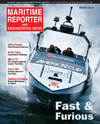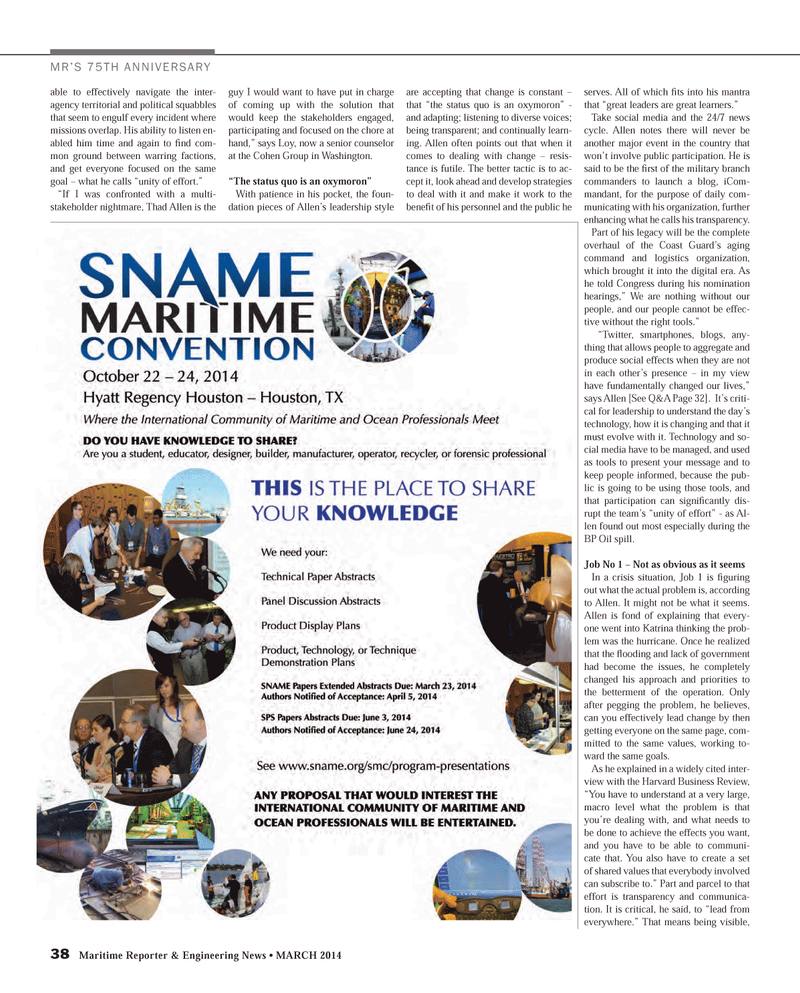
Page 38: of Maritime Reporter Magazine (March 2014)
U.S. Coast Guard Annual
Read this page in Pdf, Flash or Html5 edition of March 2014 Maritime Reporter Magazine
38 Maritime Reporter & Engineering News • MARCH 2014
MR’S 75TH ANNIVERSARY able to effectively navigate the inter- agency territorial and political squabbles that seem to engulf every incident where missions overlap. His ability to listen en- abled him time and again to fi nd com- mon ground between warring factions, and get everyone focused on the same goal – what he calls “unity of effort.” “If I was confronted with a multi- stakeholder nightmare, Thad Allen is the guy I would want to have put in charge of coming up with the solution that would keep the stakeholders engaged, participating and focused on the chore at hand,” says Loy, now a senior counselor at the Cohen Group in Washington. “The status quo is an oxymoron”
With patience in his pocket, the foun- dation pieces of Allen’s leadership style are accepting that change is constant – that “the status quo is an oxymoron” - and adapting; listening to diverse voices; being transparent; and continually learn- ing. Allen often points out that when it comes to dealing with change – resis- tance is futile. The better tactic is to ac- cept it, look ahead and develop strategies to deal with it and make it work to the benefi t of his personnel and the public he serves. All of which fi ts into his mantra that “great leaders are great learners.”
Take social media and the 24/7 news cycle. Allen notes there will never be another major event in the country that won’t involve public participation. He is said to be the fi rst of the military branch commanders to launch a blog, iCom- mandant, for the purpose of daily com- municating with his organization, further enhancing what he calls his transparency.
Part of his legacy will be the complete overhaul of the Coast Guard’s aging command and logistics organization, which brought it into the digital era. As he told Congress during his nomination hearings,” We are nothing without our people, and our people cannot be effec- tive without the right tools.” “Twitter, smartphones, blogs, any- thing that allows people to aggregate and produce social effects when they are not in each other’s presence – in my view have fundamentally changed our lives,” says Allen [See Q&A Page 32]. It’s criti- cal for leadership to understand the day’s technology, how it is changing and that it must evolve with it. Technology and so- cial media have to be managed, and used as tools to present your message and to keep people informed, because the pub- lic is going to be using those tools, and that participation can signifi cantly dis- rupt the team’s “unity of effort” - as Al- len found out most especially during the
BP Oil spill.
Job No 1 – Not as obvious as it seems
In a crisis situation, Job 1 is fi guring out what the actual problem is, according to Allen. It might not be what it seems.
Allen is fond of explaining that every- one went into Katrina thinking the prob- lem was the hurricane. Once he realized that the fl ooding and lack of government had become the issues, he completely changed his approach and priorities to the betterment of the operation. Only after pegging the problem, he believes, can you effectively lead change by then getting everyone on the same page, com- mitted to the same values, working to- ward the same goals.
As he explained in a widely cited inter- view with the Harvard Business Review, “You have to understand at a very large, macro level what the problem is that you’re dealing with, and what needs to be done to achieve the effects you want, and you have to be able to communi- cate that. You also have to create a set of shared values that everybody involved can subscribe to.” Part and parcel to that effort is transparency and communica- tion. It is critical, he said, to “lead from everywhere.” That means being visible,
MR #3 (32-41).indd 38 3/4/2014 10:55:21 AM

 37
37

 39
39
